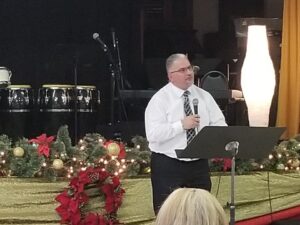In all of this uncertainty in this country in the political, social, economic and medical realms, it is always good to come to the Word of God to get some stability as His Word and promises never change nor fail. I have recently begun a teaching from 1 John on our Bird’s Eye journey through the Bible that began back in 8/2013. There is a promise in the beginning of chapter 2 that always brings me great joy and relief.
“My dear children, I write this to you so that you will not sin. But if anybody does sin, we have an advocate with the Father—Jesus Christ, the Righteous One. He is the atoning sacrifice for our sins, and not only for ours but also for the sins of the whole world.” (1 John 2:1-2)
John uses three terms to describe Christ’s sacrifice for our sins: (1) He is our Advocate with the Father; (2) He is Jesus Christ the righteous; and, (3) He is the propitiation or expiation or atoning sacrifice for our sins. Then John adds (2:2), “and not for ours only, but also for those of the whole world.”
“Advocate” is from the Greek word that is transliterated, “Paraclete.” It is used of Jesus Christ only in our text. Jesus uses it of the Holy Spirit (John 14:16, 26; 15:26; 16:7). It refers to one who is called alongside to help, especially in a court of law. If you have been accused of a crime, you need an attorney to come to your aid by pleading your case before the bench. The Holy Spirit comes to believers in Christ’s stead to testify of Him and lead us into all truth. He assures us that we are children of God (Rom. 8:16). “The Spirit himself testifies with our spirit that we are God’s children.”
But here John says that Jesus is our Advocate in heaven, “with the Father.” “With” is the same word used in John 1:1, “the Word was with God.” It means that Jesus is always before the Father. He never takes a vacation or a break. Whenever we need Him (which is always!), He is there, coming to our aid. When we sin, Satan, the accuser of the brethren (Rev. 12:10; Zech. 3:1-5), charges us as guilty before God. Jesus Christ, our defense attorney, steps to the bench, but He does not enter a plea of “not guilty.” That would not be true. We have sinned. Rather, He enters a plea of guilty, but then He argues for pardon because He paid the penalty for that sin by His substitutionary death. Therefore, His client is not liable for punishment.
And, although we should confess our sins (1 John 1:9), John does not say, “If we confess our sins, we have an Advocate.” Rather, he says, “If anyone sins, we have an Advocate.” Our forgiveness and our standing with God do not depend on anything we do, but rather on the finished work of Christ. If we are His children through the new birth, He is there before the Father on our behalf, pleading His blood, even before we confess our sins!
This is another way of stating the heavenly ministry of Christ’s intercession for us. Hebrews 7:25 says: “Therefore He is able also to save forever those who draw near to God through Him, since He always lives to make intercession for them.” The intercession of Christ is a continual application of his death for our salvation. Because Jesus Christ is perpetually in heaven presenting His shed blood, every person that draws near to God through Christ can know that the accuser has no grounds for conviction. We are guilty as charged, but the penalty has already been paid by our Substitute, who pleads our case for us!
Note also that John does not say that our Advocate pleads our case before the Judge, but rather, with the Father. God is not a hostile Judge who has to be won over grudgingly. Rather, He is the loving Father who sent His own Son to pay the penalty that we deserved! The Father did not compromise His own righteousness or justice in any way, because His sinless Son fully met the demands of His holy law. Thus, as Paul puts it (Rom. 3:26), God is both “just and the justifier of the one who has faith in Jesus.” In other words, God’s grace does not mean that He tolerantly sets aside His own righteous demand that the penalty of sin be paid. Rather, His righteous demand was fully satisfied by the death of His Son. If we have trusted in Him, our sins are paid in full!
John calls Him “Jesus Christ the righteous.” Each name points to an essential part of our forgiveness. In the first place, we needed a human Savior, Jesus. Only man could atone for the sins of people. Jesus was completely human, not just in appearance, as some of the heretics maintained, but in His nature. But, we also needed a divine Savior. Jesus is the Christ, God’s anointed one, sent to bear our sins (Isaiah 53). A mere man’s death would only pay for his own sins. But as God in human flesh, Jesus’ death had infinite merit to atone for the sins of all that the Father had given to Him.
But, also, He is Jesus Christ the righteous. Jesus had to be “a lamb unblemished and spotless” (1 Pet. 1:19). If He had sinned, He would have had to die for His own sins. But He fully kept God’s law, in dependence on the Father. His righteousness is freely imputed to the one who trusts in Him. As Paul wrote (2 Cor. 5:21), “He made Him who knew no sin to be sin on our behalf, so that we might become the righteousness of God in Him.” This means that Jesus Christ alone is an adequate Savior. He is all that we need to stand before the holy God, not in a righteousness of our own, “derived from the Law, but that which is through faith in Christ, the righteousness which comes from God on the basis of faith” (Phil. 3:9). We can add nothing to what Christ has done.
The word that John uses (also in 4:10; a similar word is used in Rom. 3:25 & Heb. 2:17) was used in ancient pagan writings to refer to the appeasing of an angry god, usually by a sacrifice or offering. If you had done something to make one of the gods mad, you had to do something to placate him and get in his good graces.
The difference between the pagan and the biblical concepts is that in the Bible, it is never man that takes the initiative to placate God. Rather, God took the initiative to satisfy His own wrath so that His love may now be shown to the guilty sinner. Rather than man piling up good works or sacrifices to placate God’s wrath, the Bible says that God did what all our good works or efforts could never do. He sent His own Son as the righteous substitute to bear His wrath on the cross. Propitiation is “an appeasement of the wrath of God by the love of God through the gift of God.” All that we can do is trust Christ’s sacrifice on our behalf. It is all of God’s grace.
This is one promise, in this ever-changing world, that will never change, and you can bank your life and eternity on it! His Word never FAILS!
-Pastor Jeff Rector



